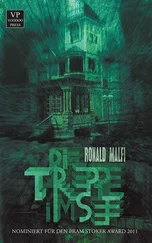I was breathing heavy, fogging up the windows again.
I shut the car off, grabbed the box from the passenger seat, and got out. Movement off to my right caught my attention, and I jerked my head toward the side of the house where I was somewhat relieved to find an umbrella-shaped clothes wheel shaking in the wind. In the distance, an unfriendly dog was anxious to be heard.
I mounted the front porch, the boards brittle and gaping with splintered holes hungry to bite at my ankles, and knocked on the frame of the outer screen door.
Waited. Waited for an eternity. I couldn’t hear any movement inside. Also, there weren’t any cars parked anywhere.
The front door opened, leaving only the dirty screen door between us. It was Veronica Dentman—I was certain of it—although she looked nothing like I thought she would. She was small, disconcertingly thin, with large dark eyes and choppy black hair. She was maybe thirty-eight, forty at best, but the sallow features and emptiness in her gaze made her look much, much older.
Those large roving eyes took me in.
I waited for her to say something, but she only stared at me. “Miss, uh . . . Veronica Dentman?”
Her eyebrows came together. “Who’re you?” The words came out sharp and quick, almost mashed together. I caught a glimpse of bad teeth.
“I’m real sorry to disturb you, ma’am. My name’s Travis Glasgow. My wife and I moved into your old house in Westlake.”
“Was my father’s house.” Her gaze shifted toward the box in my arms. I could see in the slight softening of her features that she knew what was inside. Then she stared at me, her piercing black orbs boring into me through the moss-discolored screen.
“I’m sorry,” I said again. I could think of nothing else to say. “I didn’t mean to intrude.”
Veronica pushed the screen door open several inches; the squeal of its hinges sounded like a cat being boiled alive. “Those my boy’s things in that box?”
“Yes, ma’am.”
Those searchlight eyes addressed me again, taking in every nuance of me as if to catalogue it for later reference. Just when I became certain she’d tell me to get the hell off her property, she pushed the screen door open farther and motioned me inside.
The place was small and cramped, furnished in a tawny shag carpet straight from 1975 and mismatched furniture that hung around like strangers forced together in a waiting room. The walls were almost completely barren, and the windows had their curtains drawn. I could faintly smell coffee brewing from the kitchen nook. The whole interior was dimly lit with wood-paneled walls, and something about it reminded me of a church confessional.
“I didn’t think I was going to find the place,” I commented, trying to sound conversational.
“Who sent you here?”
The question caught me off guard. I stammered, “Uh, no one.”
“Why are you here?”
“To bring this to you.” The box was growing heavier and heavier in my arms. I shifted it uncomfortably.
“Set it on the table,” she said, motioning in the general vicinity of a circular card table by the front door.
I set the box down on top of several envelopes addressed to David Dentman. Until just then, it hadn’t occurred to me that she might still live with her brother.
Stuffing my hands into the too-tight pockets of my jeans, I faced Veronica. She was unhealthily thin to the point where it looked like her drab little housedress (which looked homemade) was still on its hanger. Her arms were long and emaciated; fat blue veins were all too visible beneath her skin. She’d tucked her ratty hair behind her ears when I wasn’t looking, and I could see now the railroad scar that began high up in her hairline, dipped along her left temple, and hooked around underneath her left ear.
It was all I could do to find my voice. “I didn’t know what to do with them. The boxes, I mean. There were so many, and I couldn’t just get rid of them. And anyway, I thought you might . . . maybe . . . I’m sorry for your loss.”
“David put them down in the room, didn’t he? Behind the wall?”
“Yes,” I said. “In the basement. What . . . what is that room?”
In the kitchen something sizzled, and I could smell the coffee overpercolating.
Veronica didn’t say a word. She just pivoted, barefooted, and practically floated like a ghost out of the room and into the kitchen.
I held my breath and heard the coffeepot rattle and cupboards opening and closing, their hinges just as vocal as the screen door’s. In her absence I scanned the rest of the room. The whole place had the smell, the feeling, of someone who’d lost a child: that closed-off-from-the-world stagnancy, like uncharged batteries. But there was something else, too . . . something that took me more than just a few seconds to work out. And then I suddenly knew what it was. There was a complete lack of any personal effects. No photos, no magazines, no books, no bric-a-brac. The only thing in the entire room that didn’t serve a strictly functional purpose was the television, which was muted and tuned to QVC.
Veronica returned, cupping a mug of steaming black coffee between her hands like a nun carrying the Holy Eucharist. Wordlessly, she extended it to me.
“Thank you,” I said, aware that I was talking just a hair above a whisper. As if to speak any louder would send this fragile creature scurrying for cover.
“Do you want something from me?” she said. “Is that why you’re here?”
“No. I told you, I just wanted to bring back some of Elijah’s things.”
She cringed at the sound of his name.
“I haven’t gotten rid of anything,” I went on. “All that stuff is still in the basement. My wife wants me to get rid of it, but I came to make sure you didn’t want it back.”
“I don’t want to talk about that stuff.”
“Okay.”
Somewhere out in the front yard I could hear a vehicle approaching. Veronica whipped her head toward the door. The engine died and I heard a car door slam. When she turned to me, she looked like someone who’d just witnessed a horrible car accident.
“Is that David?” I said. “Your brother?”
“You shouldn’t have come here.”
“I didn’t mean to upset you.”
“It’s not good that you’re here.” She grabbed the coffee cup from me, sloshing thick brown sludge onto my hand and scorching the skin. “You shouldn’t be here.”
The front door opened. I hadn’t realized just how gloomy the house was until the sun broke in like the finger of God. I winced. The figure that paused in the doorframe was hulking and broad-shouldered, the silhouette of a lumberjack or a walking cement truck.
I nodded once compendiously in the man’s immediate direction.
David Dentman entered the house, allowing the screen door to slam against the frame behind him. He was light skinned and broad featured, with sandy-colored hair and very clear, somber eyes, the color of which I’d never seen. He wore a chambray work shirt cuffed to the elbows, exposing a pair of sunburned arms that could have been pythons sliding into his sleeves. “What’s this?” he asked no one in particular.
“My name’s Travis Glasgow,” I said, stumbling over my words. I was sweating profusely, only partially due to the fever I knew was working its way through me. “My wife and I moved into your old house in Westlake.”
“Glasgow,” he repeated, tasting the name. One of his big catcher’s mitt hands disappeared behind his back to dig around in the rear pocket of his dungarees.
For one heart-stopping second I was sure he was going to produce a knife and take a swing at my face. Instead, he fished out a worn leather wallet nearly as thick as a paperback novel and tossed it on the table beside the cardboard box.
Читать дальше









